Cooking while camping is one of our preferred activities – who doesn’t love a hot soup after a long hike in winter? Or a light and refreshing grilled corn during summer? Oh, we love it!
There are different ways to prepare your meals when camping – you can use an electric skillet, a woodfire, or a camping stove. Butane and propane devices are the most famous portable stove options and are commonly used by campers. But is butane or propane better for a camping stove?
There is no perfect answer to this question, and it depends on your needs. Butane stoves are known to be lighter and, therefore, easy to carry around by hikers and backpackers. On the other hand, propane stoves are better suited for camping in low temperatures and high altitudes because of its boiling point.
But, what are the other differences between them (storage, price, availability, etc.)? Which one should you use? Let’s go through the response to these questions below.
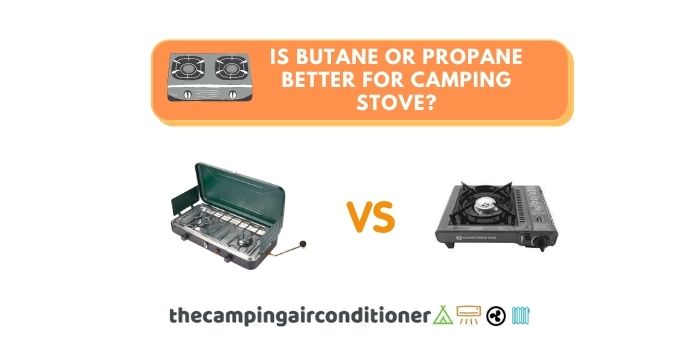
What is propane?
Propane is a gas derived from petroleum and natural gas processing, and it is generally stored as a liquid under pressure.
At normal pressure (standard air conditions), the liquid becomes gas again and has high combustion features, being widely used as burners.
During the combustion process, propane gas releases water and monoxide carbon (CO), which might increase tent condensation and risks of CO poisoning.
Propane has been used for camping stoves and tent heaters, given its ease of transportation, storage, safety, and heating output capacity.
What is butane?
Similarly to propane, butane comes from derivatives of petroleum and natural gas. Butane is highly flammable, and it is typically used as a heating fuel, propellant for aerosols, and refrigerant.
Butane has high availability in the market, and you can easily find canisters in the supermarket next to your place.
Conversely to propane, it is a gas under atmospheric pressure. However, it aslo produces CO and water during its burning processes.
It is also widely used for cooking and heating devices, even though its use as a heater might be because of its higher boiling point (see below to understand further).
Butane vs propane - what are the main differences?
The answer to this question has multi-facets. Let’s go through each of them below.
#1 - Boiling temperature
That is probably one of the most significant differences between propane and butane. Remember that both fuel types are only flammable when in gas form.
While butane boils around 30°F (-1° to 0°C), propane has a much lower boiling point – -43.6°F (-approximately -42°C).
And why is that so important?
The ignition of butane as a liquid (in temperature below -1°C) is much harder, making it a good fuel only for the “hot” season (temperatures above 0°C).
On the other hand, propane can be used in your camping trips all year round since it only becomes liquid at temperatures below -42°C.
#2 - Flames temperature (Hotness) and Heating Output
Overall, the flames are almost identical, with butane burning at 3578°F, while propane burns at 3573°F.
According to the engineering toolbox, propane releases approximately 21,564 BTU per pound (454g), while butane releases just over 21,640 BTUs per pound (454g), making them very similar in terms of heating output as well.
#3 - Weight
Propane is slightly lighter than butane if considered only the gases themselves.
However, as previously discussed, propane is stored under pressure, which requires robust storage bottles, whilst butane can be stored in aluminium bottles, making the packages lighter (for the same gas volume).
Therefore, if you are backpacking or hiking and are worried about camping gear load, butane might be your choice.
#4 - Storage
When it comes to storage, these types of fuel come with significant differences.
Butane should be kept indoors (inside your tent) and be locked away from children and pets.
You should not leave canisters with direct exposure to sunlight and place them far away from any electric equipment/output. Overall, it is recommended that butane bottles are stored at temperatures no lower than 32 degrees Fahrenheit or no higher than 125 degrees Fahrenheit.
Propane, on the other hand, is safe to be stored outside. You can leave it in an area with good air circulation and avoid moisture/water exposure that might cause rust in the bottles.
#5 - Cost
The cost of both fuels tends to fluctuate from time to time, given that they are petroleum derivatives and will follow the quotation of this commodity. However, propane is generally cheaper than butane.
The graph below was extracted from Energy Information Administration and details the price behaviour for propane and butane from Dec/2002 to Dec/2021 (Green line is Butane; Blue line is propane).
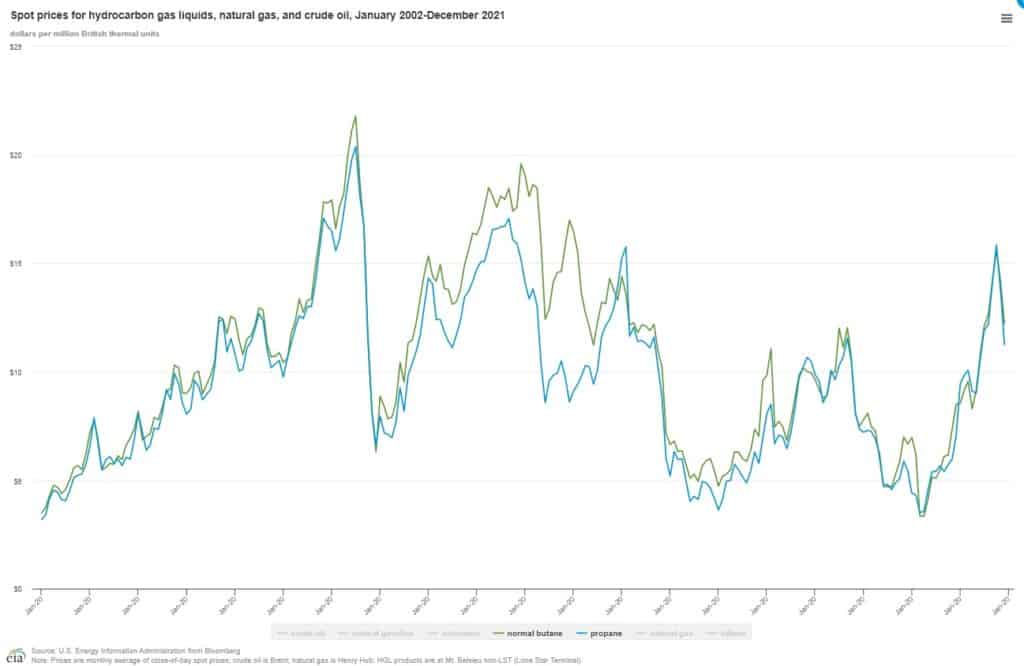
Note: In some cases and regions, you might find that propane is more expensive than butane. This might be a consequence of product availability and storage costs.
#6 - Cooking capacity
Butane provides 12% more energy than propane, being more efficient and allowing you to cook longer with the same gas volumes.
Propane vs Butane - Summary Comparison Table
| Comparison | Butane | Propane | Notes |
| Boiling Temperature | 30°F (-1° to 0°C) | -43.6°F (-42°C) | Prefer propane in cold weather camping |
| Flames and Heating Output | 21,640 BTU / lb | 21,564 BTU / lb | No significant difference |
| Weight | Lighter | Propane Canisters are heavier | Butane is ideal for backpackers (in summer) |
| Cost | More expensive | Cheaper alternative | Price vary drastically (according to crude oil price) |
Is butane or propane better for camping stove, then?
It depends on your camping needs and conditions. Let’s go through some scenarios and recommendations below.
#1 - What camping stove is better for backpacking and hiking?
When hiking or backpacking, it might be good to bring your butane device, given less camping gear required (lighter bottles) to run it.
#2 - What camping stove is better for winter camping?
If you are planning a winter trip with temperatures below 30°F (-1° to 0°C), you should use a propane stove. Butane options will not work well in winter conditions because of its boiling point.
#3 - What camping stove is better for summer camping?
Both propane stoves and butane stoves will perform well in summer camping conditions. What should lead your decision here is the device that you have, fuel availability and price.
#5 - I want to bring minimal camping gear. What camping stove should I pick?
Overall, butane stoves are compact and lightweight, when compared to propane. Butane canisters are way lighter than propane bottles.
Further, as shown above, butane is more efficient than propane, meaning that you going to carry less gear to have the same heating output.
#6 - I don't have storage space in my tent. Which camping stove should I choose?
Propane can be stored outside with some minimal safety measures, whereas butane should not be exposed to sunlight for prolonged periods.
In this case, pick a propane stove.
Other items you should consider when choosing between a butane and a propane camping stove
Refilling capacity
Overall, butane canisters are disposable and are not prepared to be refilled (don’t try to fill them – you might be exposing yourself to several risks).
Propane cylinders have a robust structure and can be reused and refilled with no problems. The video below details how to do it yourself with a refill adapter.
Fuel Availability in your area
Propane cylinders are commonly found across supermarkets and retail stores because of their safety, easy storage, and wide use.
Even though butane canisters can be easily bought too, they are not as common as propane.
Propane and Butane Stoves recommendations
Our propane camping stove recommendations
- Best propane dual burner option – Coleman Triton Propane Dual Burner Stove
- Best propane option for backpackers and hikers – Coleman Portable propane stove 10,000BTU
- Best propane options w/ grill – Coleman Portable Stove w/ Grill (up to 20,000 BTU)
Our butane camping stove recommendations
- Best butane one burner stove – ChefMaster 90011 – 10,000 BTU
- Butane stove Budget Friendly Option – GasOne 10,000BTU
- Classic options – Coleman portable butane stove (7,650 BTU)
Our dual fuel camping stove recommendations (hybrid)
- Best Dual Fuel Camping Stove – Gas One GS3400P propane or butane stove
- Best Dual Fuel camping stove for hikers and backpackers – MSR PocketRocket 2 Ultralight
What is a isobutane stove?
As the name suggests, these stoves run from Isobutane, which is an isomer of butane, meaning that it is also derived from petroleum and natural gas.
It is technically a mix of butane and propane and theoretically combines the best of both worlds – canisters are lightweight and have lower boiling than butane (-11.7°C).
Pros and Cons of Isobutane Stove
Pros
- Able to run in low temperatures (until –11.7°C)
- Flames temperature similar to propane and butane
- Canisters are lightweight
Cons
- Does not work well in high altitudes
- Lower availability
FAQ
Is a butane camp stove safer than propane?
Both gases are safe and non-toxic and are a great source of energy. Overall, neither is safer.
Which is better for cooking butane or propane?
Even though there is a myth that propane is better for cooking, both produce similar heating output and maximum flames temperature. Therefore, neither option is better.
However, on a winter trip, propane will be your go-to option because of its lower boiling point.
How many BTU do I need for my camping stove?
Overall, we recommend sticking to options with at least 10,000 BTU to ensure you can properly cook your meals.
If you are camping in large groups, the best option might be picking a dual burner with 10,000 BTU heating output each (20,000 Btu total).
Which lasts longer propane or butane?
Butane provides 12% more energy than propane, making it more efficient and able to last longer for the same heating outputs.
Can butane stoves run on propane gas?
Yes, you can, but we do not recommend it, as we detailed in another article – read it here. In summary, even though similar, propane and butane are different gases with different features and using them interchangeably might induce malfunctioning, yellow flames, and carbon monoxide poisoning risks.
We recommend investing (less than $50) in a dual fuel camping stove, such as Gas One GS3400P propane or butane stove, if you want to have flexibility.
Can I use a stove inside my tent?
We have written an article about this question. Even though it is not ideal, you can use a stove inside your tent, provided you follow some safety measures, such as:
- Ensure there is plenty of ventilation in your tent
- Use a carbon monoxide detector
- Remove or isolate any flammable material
- Use a fire mat below your stove
- If you intend to use a stove inside your tent routinely, buy a tent with a stove jack.
What can I use instead of gas stove?
If you have the electric infrastructure around you, we suggest considering an electric stove, such as Techwood portable stove.
They are efficient and safe to use inside your tent since they do not release CO and deplete oxygen levels (pay attention to overheating, though!).
Conclusion
By the end of this article, we hope the differences between propane and butane stoves are clear to you (they are summarised below).
Each stove will suit different camping needs and environments. If you are after a lightweight option, butane stoves are the go-to option.
On the other hand, they will not be efficient (because of their boiling point) during heavy winter camping, and, therefore, propane burners should be your alternative.
Propane devices are also the best option if you don’t have enough storage space inside your tent.














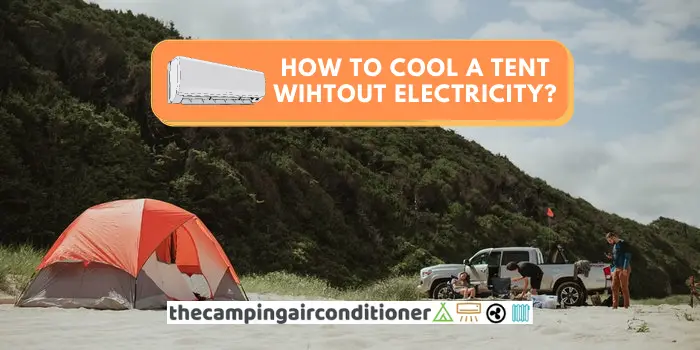
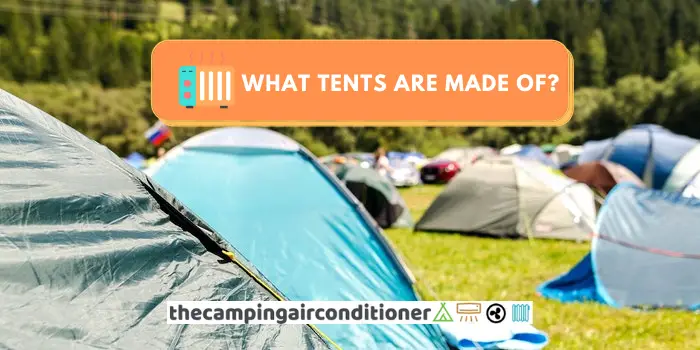
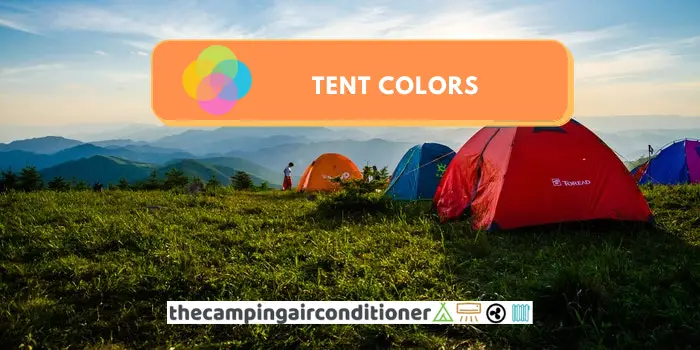


Before calling for professional help, you can try a few troubleshooting steps at home. These include checking the power supply, setting and etc…
Your comment is awaiting moderation.